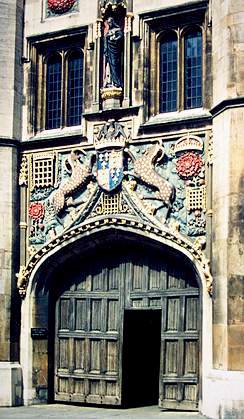The universities
After completing grammar school, a select few young men had the privilege of attending university --women were not permitted to receive a formal university education. As the middle classes began to prosper in the reigns of Elizabeth and James, attendance at colleges increased significantly.
In the beautiful fabric of the kingdom of England the two eyes are the two universities, Oxford and Cambridge, those two nurseries or seminaries of learning and religion, which for number and magnificence of richly endowed colleges, for liberal stipends to all sorts of public professors, for the well furnished public and private libraries. . . for number and quality of students, for exact discipline and order, are not to be paralleled in the whole world.
William Harrison, The Description of England, ed. Georges Edelen (Ithaca, New York: Cornell University Press, 1968).
What did they study?
They did not study Shakespeare's works, certainly, though some students did comment on him in plays written for performance at one of the colleges.
The seven liberal arts studied in medieval and Renaissance universities were grouped into two disciplines: the "trivium" (grammar, rhetoric, and logic) and the "quadrivium" (astronomy, geometry, arithmetic, and music). A university education was a very conservative affair: the new interest in Greek, in Plato, and in new approaches to medicine were largely ignored in favour of the traditional studies centred on the early theologians of the Church, and (of course) the Bible.
Footnotes
-
Student life
All that intend to take any degree are to take their diet and lodging and have a tutor constantly in some college or hall; then they are to perform all exercises. . .They are to suffer themselves to be shut up by night in their several houses. They are never to be seen abroad out of their chambers, much less out of their colleges, without their caps and gowns. . .
(From Edward Chamberlayne, The Second Part of the Present State of England, 1682, 303-15; in Cressey, 119.)
Individual tutors were frequently assigned to wealthy students to keep them from living riotously. In Middleton's play A Chaste Maid in Cheapside, Tim, the son of the goldsmith Yellowhammer, is accompanied continually by his tutor; they speak much Latin together, but Tim ends up being tricked, despite all their learning.
-
Birth of a college
Jesus College, Oxford, was founded in 1571 by Queen Elizabeth I. The "letters patent" establishing the College make clear her intention to create a training ground for orthodox religious learning, with a strong humanist component. She dedicated the College:
. . . to the Glory of God Almighty and Omnipotent, and for the spread and maintenance of the Christian religion in its sincere form, for the eradication of errors and heresies, for the increase and perpetuation of true loyalty, for the extension of good literature of every sort, for the knowledge of languages, for the education of youth in loyalty, morality, and methodical learning, for the relief of poverty and distress, and lastly for the benefit and well-being of the Church of Christ in our realms, . . . we have decreed that a College of learning in the sciences, philosophy, humane pursuits, knowledge of the Hebrew, Greek and Latin languages, to the ultimate profession of Sacred Theology, to last for all time to come, be created, founded, built, and established. . . .
(Dated 27 June 1571. The letters patent of Jesus College appear in Survey of Oxford by Rev. H.E. Salter, ed. by W.A. Pantin, Oxford Historical Society, 1960, as quoted by J.N.L.Baker in Jesus College Oxford 1571-1971, Oxford: Oxonian Press, 1971.)
One of the first fellows was Lancelot Andrewes, whose religious prose was later to be admired by T.S. Eliot.
